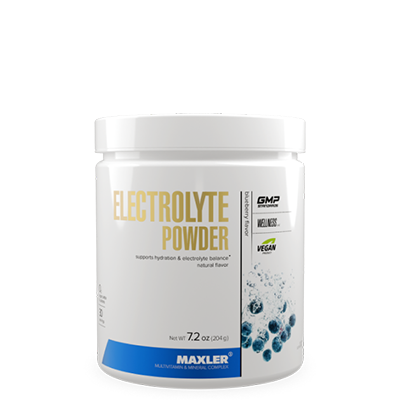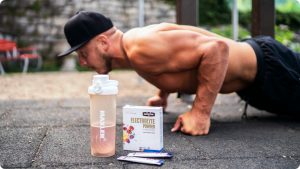Remember the last time you had a workout so hard your sweat levels shot through the roof? Or the feeling of thirst after a particularly grueling workout? We’ve all been there. Sometimes, no matter how much water you drink during a workout, it might feel insufficient. You might have thought about using a sports drink instead next time.
Sports drinks seem like the perfect solution for hydration during a workout. They’re delicious, fun, and have all the minerals you’re sweating out. However, it’s easy to overdo or use sports drinks when you don’t need them. And in that case, you’re just getting more calories in without much benefit.
If you’re curious about what is an isotonic sports drink and how to use sports drinks properly, you’re in the right place.
What Is an Isotonic Drink?
Isotonic, hypertonic, what does it all mean?
Three types of sports drinks are available. They are hypertonic, hypotonic, and isotonic. What are they, and when can they be useful?
Let’s get down to the basics. When we add something to water, we get a solution. The solution has a particular concentration of the solute, the thing we added to water. Our blood, for example, is a solution with electrolytes and nutrients dissolved in it. Our blood generally has a concentration of 274-295 mOsm/kg. The last bit is the unit that we use to denote concentration.
When we drink water or any liquid, it goes into our stomach and our gut. From there, it needs to get into our bloodstream. Water moves into cells and our blood through osmosis. Osmosis is the word we use to describe the movement of water from one place to another through a semi-permeable membrane. Our cell walls act as a membrane in this case.
Osmosis follows one important rule – water will always go from a place of high concentration to a place of low concentration. That means it will go from a place with lots of water (our stomach) to less water (our blood).
Now that we understand water’s movement, let’s get down to defining isotonic, hypertonic, and hypotonic solutions.
Hypertonic solutions or sports drinks are those that have a lot of sugars and electrolytes in them. The solute concentration in these drinks is higher than in our blood. The concentration of water is lower than in our blood. That means that after drinking them, our body’s water will go into the stomach to even it out. This means that we ultimately get dehydrated from drinking hypertonic sports drinks. However, these can be useful when we need to get a lot of carbohydrates in, such as after a workout.
Isotonic sports drinks have the same concentration of sugars and electrolytes as our blood concentration. Therefore, the water won’t move if you’re hydrated but will move into your blood if you’ve been sweating.
Hypotonic solutions or sports drinks have less sugars and electrolytes than our blood. They instead have more water than our blood. In this case, the water from the solution will move into the blood efficiently. These are great for when you need to rehydrate yourself quickly.
Now that you know what an isotonic sports drink is, let’s understand what it does.
What Does an Isotonic Drink Do?
The primary role of an isotonic drink is to support proper hydration. Hydration is essential for athletes, as it impacts performance. Water losses of as little as 2% of body weight lead to significant performance decreases, leading to:
- Heart having to work more
- Inability to cool down
- Increased tiredness
- Worsened blood flow
- Lower endurance performance under certain conditions
Isotonic drinks help address that by supplying water to the body. In addition, their carbohydrate content helps feed the muscles during long workouts. The electrolytes in sports drinks help to replenish electrolytes lost with sweat.
Composition of Isotonic Sports Drinks
What are the ingredients that make up an isotonic drink? A typical sports drink has:
- Carbohydrates – these are typically simple sugars like glucose and fructose. The sugars help support energy levels during a workout and decrease tiredness.
- Electrolytes – they are minerals in the drink, such as sodium, magnesium, chlorine, and potassium. The electrolytes help replenish your electrolyte levels, allowing the muscles to work correctly.
- Water – the base for all isotonic drinks is water. Water is vital for rehydration, and you aim to get more of it when you drink isotonic beverages. However, if you’re relying on isotonic powders for drinks, you may not find water in the ingredient list. You’ll add water when you mix the powder.
- Flavorings and colors – many isotonic sports drinks will contain colors and flavors to make the drinks taste nice. You may also see some drinks with added sweeteners to improve the taste. Alternatively, sugar-free isotonic drinks may contain sweeteners. These will usually include just electrolytes and water.
- Additional ingredients – these are things like complex carbs, vitamins, and maybe even stimulants like caffeine. For example, Isoactive isotonic drinks contain additional group B vitamins. There’s no real need for these ingredients in isotonic drinks, but they are an option if you require them.
Therefore, a typical isotonic sports drink should contain some carbohydrates, electrolytes, and water. The rest are additional ingredients to improve palatability or address specific concerns, such as replenishing vitamins.
Don’t confuse isotonic drinks with energy drinks or sports waters.
Energy drinks and sports drinks are two different things. Sports drinks contain sugars and electrolytes and are aimed at helping you rehydrate during exercise. Energy drinks also contain sugars; however, they typically contain additional stimulants like caffeine, guarana, or even ginseng. Therefore, an energy drink or a pre-workout blend may be a better choice if you are looking for an energy boost.
If you want to learn more about pre-workout supplements and blends, check out this post.
On the other hand, sports waters are just another name for sugar-free sports drinks. They typically contain electrolytes but no carbohydrates. You can make sports water yourself with an electrolyte mix like Maxler Electrolyte Powder.
Types Of Isotonic Sports Drinks
There are three types of sports drinks: isotonic, hypotonic, and hypertonic. Each can be suitable for specific situations.
Isotonic drinks are great when you need additional carbohydrates to keep you going during the workout. In addition, they help with water intake.
You can find isotonic drinks pre-made. These are things like Lucozade, Gatorade, and Aquarius. Alternatively, many sports nutrition brands have isotonic drink mixes. These are powders that you can use to make isotonic drinks.
Always check the osmolarity or concentration of isotonic sports drinks before buying them. An older study found that “isotonic” drinks sold in Switzerland tend to have a wide range of concentrations, from hypotonic to hypertonic.
Hypotonic drinks are great at helping you quickly replace the water you lose during an exercise session. They tend to have less carbohydrates and electrolytes than isotonic drinks.
Hypertonic drinks are designed to help you take in lots of carbohydrates to replace glycogen. They’re better off saved for recovery than used during exercise, as they dehydrate you.
Benefits of Isotonic Sports Drinks
Isotonic sports drinks are an attractive way to support your hydration and energy levels. But what are their actual benefits?
The benefits of using isotonic sports drinks include:
- Less muscle damage. There may be less muscle damage when users drink sports drinks, which can be beneficial for those needing a quick recovery.
- Improved performance. Around 20 grams of carbohydrates are sufficient to improve performance.
- Less tiredness. Adding a carbohydrate drink helps lower tiredness, as it can be used if muscle glycogen is depleted.
- Better endurance. Isotonic drinks with carbohydrates can help improve time to exhaustion and overall time in time trials.
- Better rehydration for recovery. Sports drinks can be used to help rehydrate and promote recovery.
How to choose the right sports drink
Choosing the right sports drink is really all about what exercise you’re doing and how your body behaves.
Those who do long training sessions can benefit from sports drinks with plenty of carbohydrates. Sports drinks are usually unnecessary for sessions under an hour or for strength training. Those who sweat a lot may want electrolyte water instead of a sports drink.
When choosing a sports drink, pay attention to the following:
- How much sugar is in your sports drink? Those who are limiting their calorie intake may want lower-calorie options.
- How much salt is in your sports drink? Those who are watching their salt intake may benefit from a lower salt option.
- What is the osmolarity of the drink? Choose drinks where you know the concentration.
- Can you trust the manufacturer? Choose quality supplements where the manufacturer is open about their ingredient and quality control.
Remember that the best isotonic drink is one that you will use and one that helps you address the concerns you have.
When to Use Isotonic Sports Drinks
Isotonic sports drinks can be used during endurance and high-intensity exercise. For training sessions lasting over an hour, consume sports drinks to get around 30-60 grams of carbohydrates each hour. This applies if you’ve not had enough food or water before exercise. It also applies if you’re exercising in a hot, cold, or high-altitude environment.
There’s typically no need to drink isotonic drinks if you’re doing resistance training.
It’s a good idea to consult with a coach or a practitioner before starting to use isotonic drinks as part of your routine. They can help you understand when to use them and how to choose drinks that will work for you.
It’s important to remember, however, that if you’re not a prolific sweater or not exercising for hours in a day, you may not need isotonic sports drinks. The sugar in them may be counterproductive to those who are on a weight-loss journey. The same applies to young athletes. Sports drinks may be attractive to young athletes and kids alike due to their flavors and sugar content; however, in most cases, they’re unnecessary.
How to Take Isotonic Sports Drinks Correctly
You can be flexible with when exactly you drink a sports drink. People playing stop-and-start sports like tennis or soccer may find opportunities to drink during breaks. In contrast, those during endurance events should start using sports drinks about an hour into their training, aiming to get around 30-60 grams of carbohydrates through the drink every hour.
In most other cases, just drinking water will be sufficient.
Where to buy Sports Drinks
You can find sports drinks and isotonic drinks in most supermarkets. However, you have to pay close attention to the sugar and salt content in these drinks to ensure that they will actually support your efforts. Some may have additional ingredients that you may or may not want, so always look at the ingredient list.
Certain sports nutrition brands can also sell sports drinks online. This may be convenient if you’re a regular user who doesn’t have the time to go to the supermarket. When buying sports drinks online, ensure that you check their ingredient list. In addition, choose brands that are open about their quality and production standards. This can help you ensure you get a quality product.
If you’re not a regular user or want to control your sugar and salt intake, making sports drinks at home is also an option. This may require time and practice, but it can be worthwhile. You can use fresh fruit juice or coconut water, salt, and electrolyte powders to really make the drink your own. In fact, this can be a great idea because fresh juice can be full of beneficial compounds found in fruits, like antioxidants.
If you’re interested in sports drinks to promote recovery, then consider milk. Milk can be a great alternative to commercial sports drinks. It contains protein and carbohydrates, which can support glycogen and muscle synthesis after a workout. In addition, it is almost isotonic. That’s why you may have seen athletes like Michael Phelps drink low-fat chocolate milk after a swim – the additional carbs make it a great low-cost choice for athlete recovery.
Isotonic sports drinks can be a great tool to support performance. They contain sugars and electrolytes at the same concentration as our blood. They can be helpful for those who do endurance exercises or those who train or compete in extreme environments. For everyone else, water is a better option for hydration.










